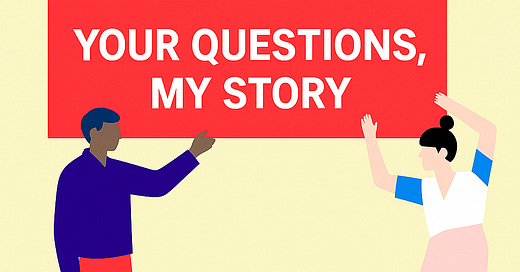#5 Answering Your Questions on Pricing, Growth & Letting Go of Translation
Your questions, my story.
A few days I published a post on rethinking pricing. The comments, private messages, and conversations that followed were both encouraging and full of thoughtful, curious questions.
So today, I want to continue the conversation and answer some of those questions more in depth.
Q1: How did you go from Phase 1 to Phase 2? From solo freelancer to outsourcing?
This is such a good question because it gets to the heart of the transition.
I wish I could say there was a clear plan, but honestly? The biggest shift came when I decided I wanted to evolve. All the rest was trial and error.
Once I realized I wanted to help more clients than I could handle on my own, outsourcing became the logical next step. That was the moment I started thinking like a project manager, not just a translator.
How did I find good freelancers in other languages? Slowly. Carefully. Through recommendations, tests, and gut feeling. Trust was earned over time. And yes, I made mistakes. But each one taught me something.
The mindset shift came first. The process followed.
Q2: Those first €100K as a translator, what market were you in? And how many hours did you work?
I worked almost exclusively in the Belgian market.
Being a Belgian Dutch-speaking native living in Brussels gave me access to a strong demand for Dutch translations, especially in creative fields like advertising and marketing. Most of the work was from small agencies with fast turnarounds and solid budgets. So while the job volumes weren’t huge, the rates were quite good.
As for hours: I worked a lot. I don’t think I ever did fewer than 8 to 9 hours per day in those early years. It was intense, but it laid the groundwork for everything that came later.
Q3: Do you ever miss translating?
I stopped translating around 2018 or 2019, and honestly? I don’t miss it.
I prefer writing, and I get to use that skill now in my marketing and content creation, so it’s still very relevant.
That said, it’s a great question, because running a translation business is completely different from doing translations. They require totally different mindsets, tools, and energy. One isn’t better than the other, just different.
Q4: What happened after those first few phases?
There were definitely more phases than I mentioned in Part 1.
Around €400K/year: We brought on a second project manager.
Around €600K: We added a third project manager.
Around €700K: We tried hiring an account manager and sales rep. It didn’t work out.
Around the same time: We started bringing in help for general operations and web marketing.
Our sweet spot revenue zone is around 850K.
I want to stress that none of this was linear or perfect.
Everything took time. I was mostly a hybrid translator/project manager freelancer from 2011 until 2017, that’s six full years. The transition to agency was slow and sometimes messy.
In fact, one of the bigger missteps early on was trying to hire two in-house translators. It didn’t work. We had too many client requests in different languages, and those two roles couldn’t cover the demand. We eventually had to let them go.
It was a hard lesson, but a valuable one. That’s when I realized it made more sense to hire a project manager to coordinate external vendors, rather than trying to do it all internally.
Mistakes like that are part of the journey. The important thing is to learn and keep moving.
I’m Tim Renders. I started as a freelance translator and built Entre les lignes, a boutique agency with millions in revenue throughout the years. These days, I share what I’ve learned and mentor other small language business owners grow their own boutique agency up to €1M in yearly revenue.
—> Book your free discovery call here.
(Very few spots left, closing applications soon)





As a hybrid translator, I also find it tricky to find good colleagues. Thanks for confirming my belief in the slow and careful process of building a strong team. It was interesting to hear about your experience with hiring two in-house translators and then wisely deciding to bring on a project manager.
I'd love it if you could share more about your experiences on these topics:
1) Booking time with top translators: How did you manage to schedule time with the limited pool of top translators? They're often quite busy, and I find it tough to get them for clients who need consistency in tone and style for long-term projects.
2) Training your first project managers and translators: Could you share some details about how you handled this?
3) Demand for translation/interpreting agencies in the age of AI: Do you still see a need for more translation and interpreting agencies? I feel like the market is pretty crowded right now. With so many LSPs and boutique agencies out there, I'm a bit hesitant to start another one. Building a small team seems more doable, and I'm also thinking about branching out into content writing, marketing, and other areas.
I'd love to hear your thoughts on these issues. Thank you so much!